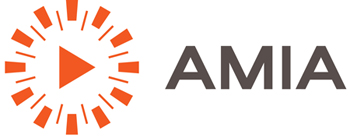2014 Open Source Digital Preservation & Access Stream Video
THE 2014 OPEN SOURCE DIGITAL PRESERVATION AND ACCESS STREAM focused on the use of open source software that is in current significant use within digital preservation and access systems. Curated by Chris Lacinak of AVPreserve in collaboration with AMIA’s Open Source Committee the stream covered larger issues such as when it does or does not make sense to take the open source approach, and how to navigate the complexities of copyright and licensing.
Open Source and Digital Preservation and Access: Open Source Tools, Technologies and Considerations
Trevor Thornton, North Carolina State University
Lauren Sorensen, Library of Congress
Software has become an integral component of digital preservation practice. Based on preservation principles as well as budgetary considerations, open source software has been embraced by the archival community. However, there is still a lack of clarity regarding the process and component parts that make up open source software projects. Trevor Thornton will present an introduction to open source development, with particular focus on developing web applications. He’ll discuss some fundamental open source concepts, provide an overview of technologies utilized in web application development, and offer important considerations for implementers at all levels. Lauren Sorensen will speak about Git and Github, providing an overview of its usefulness to developers, archives and other communities. She will focus on examining uses for Github and version control in an AV archives context, walk through Git and Github signup, review a script to demonstrate Github’s utilities, and relate these topics back to Thornton’s talk.
___________________________
Open Source and Digital Preservation and Access: One Body, Many Heads: Preservation and Access From Project Hydra
Karen Cariani, WGBH
Jon Dunn, Indiana University Library
Stefan Elnabli, Northwestern University Library
Hannah Frost, Stanford University Libraries
Open source solutions to our challenges in audiovisual preservation and access not only include tools and software applications, but technological frameworks that constitute a foundation for innovation. One such framework is Project Hydra – an exciting collaboration of archivists, media-managers, and software developers who are building and using this community-sourced application framework to create new and open systems that manage, preserve, and provide access to digital audiovisual content. This panel will showcase Hydra-influenced open source projects and strategic planning from WGBH, Indiana University Library, Northwestern University Library, and Stanford University Library. From unique audiovisual preservation systems to cataloguing and access management solutions, representatives will discuss their projects, how their work meets the growing demands of audiovisual preservation and access, and their experiences in developing for the open source community.
- Stefan Enalbi presentation (via Slideshare)
- Jon Dunn presentation (via Slideshare)
- Hannah Frost presentation (PDF)
___________________________
Open Source and Digital Preservation and Access: The First Digital Preservation Repository for Museum Collections: An Open Source Approach
Ben Fino-Radin, The Museum of Modern Art
Kara Van Malssen, AVPreserve
Dan Gillean, Artefactual Systems
For three years, the Museum of Modern Art has worked to build the first digital repository designed to meet the needs and requirements of museum collections. This new system aims to facilitate digital collections care, management, and preservation for time-based media and born-digital artworks. Long-term viability and sustainability have been at the core of the design from the outset, extending to every aspect of the project – from the interdepartmental and interdisciplinary team of advisors at MoMA that steered the project, to the fundamental involvement of outside field experts, and the decision to leverage and adapt existing, open-source software. This presentation will offer a public demonstration of this new repository system, a discussion of the development process, and insights into decisions made during its design and implementation. Emphasis will be placed on the practical aspects of project management and the process of building such a system upon open-source frameworks.
___________________________
Open Source and Digital Preservation and Access: Video Accessibility on the Web and Open Standards
Jason Ronallo, North Carolina State University
Video on the Web presents new challenges and opportunities. How do you make your video more accessible to those with various disabilities and needs? This session will focus on writing captions, subtitles, descriptions, and timed metadata tracks for Web video using the WebVTT W3C standard. Encoding timed tracks in this way opens up opportunities for new functionality on your websites beyond accessibility. The presentation will show some examples of the potential for using these standards in creative ways.
___________________________
Open Source and Digital Preservation and Access: QC Tools Official Launch
Dave Rice, QCTools
Quality Control Tools for Video Preservation (QC Tools) is an initiative to develop a suite of open source software tools, which can identify artifacts and errors prevalent in digitized analog video collections. The goal is simple: to cut down the time it takes to perform high-quality video preservation and direct time towards preservation issues that are solvable. A two year NEH- funded research and design project, QC Tools builds upon an existing error database, now aggregated and available to the public in the Audio/Visual Artifact Atlas (AVAA). For this presentation members of the QC Tools team will present the final tool, walking the audience through the process of analysis of digitized video files. Presentation topics to be covered include: The QC Tools User Interface, Overview of Analysis and Playback Filters, QCTools Building Blocks, and User Guide Help/ Documentation.
__________________________
Open Source and Digital Preservation and Access: Lightning Talks
David Rice of CUNY TV on LTFS
Hannah Frost of Stanford University on Open Annotation
Erik Piil of Anthology Archives on an Open Hardware Tape Cleaner
Kathryn Gronsbell of AVPreserve on AVPreserve’s Fixity Application
Mark Bussey of Curation Experts on WGBH’s HydraDAM
- Open Annotation: What it is and What it can do for Media Presentation by Hannah Frost
- Fixity Presentation by Kathryn Gonsbell
